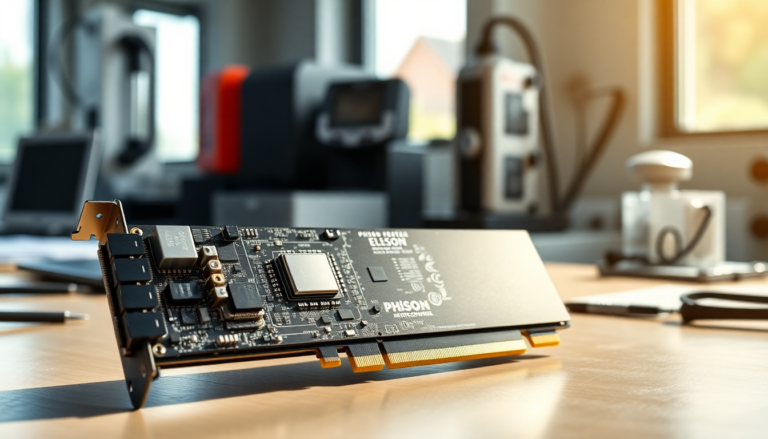Argomenti trattati
Have you ever wondered what it takes to push the limits of storage technology? The Phison E28 PCIe 5.0 SSD controller might just be the answer. Earlier this year, Phison introduced the PS5028-E28, a controller that promises to redefine speed and efficiency in the SSD market. As we eagerly await the release of drives equipped with this cutting-edge technology later this year, a sneak peek into its capabilities reveals some exciting benchmarks that could change everything for tech enthusiasts and gamers alike.
Performance comparison with leading SSDs
When it comes to storage performance, benchmarks are the name of the game. The Phison E28 recently faced off against heavyweights like the Samsung 9100 Pro, Micron 4600, and Acer Predator GM9000 in a rigorous testing environment using the PCMark 10 Full System Drive test. This benchmark isn’t just a number—it’s a real-world performance metric that simulates everyday tasks, from launching applications to transferring files. The results were nothing short of astonishing. The Phison E28 outperformed the Samsung 9100 Pro and Micron 4600 by a striking 18%, while leaving the Acer Predator GM9000 in the dust with a 32% lead.
Breaking down the numbers
Curious about the specifics? Let’s dive into the raw data. The Phison E28 scored an impressive 7,978 on the PCMark 10 benchmark, compared to 6,767 for the Samsung 9100, 6,748 for the Micron 4600, and 6,040 for the Predator GM9000. But the story doesn’t stop there. Bandwidth metrics revealed the E28 clocking in at 1,214.13 B/s, which is a 16% increase over its nearest rivals. Meanwhile, access times were equally favorable for the E28, boasting a 17% reduction compared to the Samsung 9100 Pro and Micron 4600.
Random read and write performance
But what about random performance? That’s where things get even more interesting. The Phison E28 showed a whopping 36% improvement in random read speeds and a 15% increase in random write speeds over the competition. These metrics are crucial, especially for users who engage in intense multitasking or run applications that require rapid data access. I remember when I first tried an SSD with high random performance—it was like night and day compared to traditional HDDs. It’s not just about sequential reads and writes; it’s about how quickly you can access the data you need when you need it.
Understanding the technology behind the numbers
Now, let’s take a step back and understand why the Phison E28 is performing so well. The controller uses advanced NAND technology that plays a significant role in its capabilities. For example, the Micron 4600 and Predator GM9000, despite both utilizing the SM2508 controller, show a significant performance delta due to the type of NAND employed. The Micron 4600 leverages cutting-edge Micron 276-layer B68S FortisFlash NAND, while the Predator GM9000 relies on the older Micron 232-layer B58R FortisFlash. It’s a classic case of “you get what you pay for.”
The competitive landscape of SSD controllers
As we look onward, it’s clear that while Phison dominates the PCIe 5.0 landscape, it’s not the only player in the field. Companies like InnoGrit, Marvell, and Maxio are also in the mix, but their offerings haven’t quite matched the E28’s competitive edge just yet. It’s fascinating to think about how quickly technology evolves. Just a few years ago, we were all excited about PCIe 4.0, and now PCIe 5.0 is taking center stage. The question remains—can competitors catch up, or will Phison continue its reign at the top?
Looking ahead: what’s next for Phison?
As we anticipate the arrival of drives equipped with the E28 controller, there’s a palpable excitement in the air. Will this controller maintain its lead once it’s in consumer hands? Will users experience the same performance boosts in everyday applications as the benchmarks suggest? Personally, I believe that the combination of speed and efficiency offered by the Phison E28 could redefine user expectations for SSD performance. Tech enthusiasts and gamers alike are waiting with bated breath to see how this all unfolds, and frankly, so am I. After all, in the world of technology, the only constant is change.

